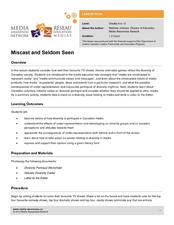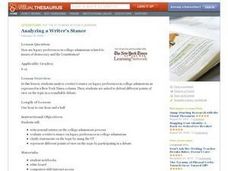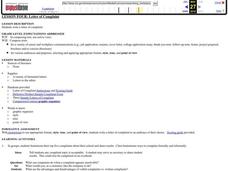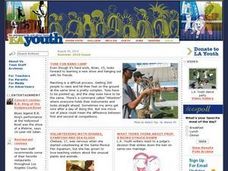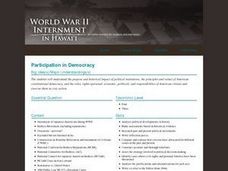Curated OER
Expressing Your Views to the Letter
Analyze the motivation, purpose, and value of letters to the editor by examining letters written in response to the violence at Columbine High School. For homework, middle and high schoolers write their own letters to the editor about an...
Curated OER
Miscast and Seldom Seen
Consider how well high schoolers' favorite TV shows, movies and video games reflect the diversity of society. The lesson introduces your class to several media literacy concepts, such as how media conveys values and messages, as well as...
Curated OER
Letter to the Editor
Students analyze and interpret letters to the editor, and use this information to write their own. Groups of students analyze letters, then submit one of their own design to an actual newspaper.
Curated OER
Persuasive Elements
Investigate letters to the editor and their persuasive qualities. Break your class into reading groups and give each one a different article. As they read, they complete a graphic organizer to record their thoughts and opinions. There is...
Curated OER
Analyzing a Writer's Stance
Should college admissions decisions be based on whether whose family members attended? Secondary students read and respond to a New York Times article on the issue of 'legacy preferences' in college admissions. Following class...
Curated OER
Dragonwings: Evaluate Chapters 10-12
As your class finishes the novel Dragonwings, use these culminating projects. A vocabulary list is given for chapters eleven and twelve and either an epitaph or letter activity concludes the book. The final project consists of creating a...
Curated OER
The Power of the Pen
Students discuss the personal and historical significance of journals, analyze the issues raised in a N.Y. Times article regarding Anne Frank's diary, and evaluate a Letter to the Editor written in response to the article.
Curated OER
It's Your Opinion
Students view "Inkheart: Speak Your Mind" by Cornelia Funke. They read several letters to the editor of a local newspaper and underline the 'opinion' portions of the letters. They discover how a literary selection can expand personal...
Virginia Department of Education
Analyzing and Planning Persuasive Writing
Young writers work backward to analyze persuasive techniques. As a class, work through the provided persuasive letter: a plea to an imaginary city council to lift a city-wide ban on fast food restaurants and discount stores. Start by...
Curated OER
Eastside Literacy Reading Lesson - Fact or Opinion
Analyze critical thinking skills that involve the ability to distinguish between fact and opinion through self-reflection. Higher education students will collect a newspaper article, advertisement, magazine article, tabloid article,...
Curated OER
Letter of Complaint
Students compose letters of complaint. In this written communication lesson, students read sample letters of complaint and use the provided graphic organizer to analyze them.
Curated OER
A Teacher's Guide to the Holocaust: Headlines
Students examine newspapers to research public opinion about the Holocaust. In this critical thinking lesson plan, students research the information Americans received in U.S. newspapers about events like Kristallnacht, the Berlin...
University of Pennsylvania
Decoding Propaganda: J’Accuse…! vs. J’Accuse…!
Reading snail mail is a great way to go back into history and to understand others' points of view. The resource, the second in a five-part unit, covers the Dreyfus Affair. Scholars, working in two different groups, read one letter and...
Curated OER
It's Your Opinion
Everyone has a different opinion about the characters they read about in books. Have your class explore forming an opinion and finding evidence to support it as they read and discuss what they think about a particular character. They...
Curated OER
Fact V. Opinion
Students use statements out of newpapers to distinguish between facts and opinions. They discuss these differences as well.
Curated OER
Writing for Different Audiences: A Discussion of Cover Letters And Resumes
Students examine the process of writing a resume. They identify examples of casual and formal language, read an article on writing resumes, discuss key questions, write a resume, and discuss and edit another student's resume.
Curated OER
Learning About Islam
Students discover how Muslim teens are affected by people's misconceptions about Islam. They see a Muslim teen's point of view on Islam and how it is portrayed in Western society and write a letter to Muslim youth group.
Curated OER
In My Honest Opinion
Students explore the function of letters to the editor for both a newspaper and its readers. They select a current event about which he or she feels strongly, reads a related New York Times article and responds to it in a letter to the...
Curated OER
Reading a Newspaper
Students define the terms associated with parts of a newspaper. They identify various sections of a newspaper and the type of articles found in each and provide the responses to who? what? when? where? and why? contained in a ...
Curated OER
Teaching Ethical Situations
Learners use journalism ethics standards to learn how to write ethically correct news stories. In this journalism and ethics lesson, students review journalism standards for ethics. Learners use the standards as they analyze example...
Curated OER
Separate But Equal Opinions
Students examine the ways in which editorials and Op-Ed pieces respond to current events. They write editorials in response to news items from the New York Times.
Curated OER
Participating in Democracy
Students analyze film clips in class. In this democracy lesson, students identify the differences between civil liberties, democracy and freedom. Students view a video regarding Japanese internment and answer study questions as well as...
Curated OER
The Lorax Explorations
Middle schoolers read and debate the purpose of Dr. Seuss' The Lorax, analyze its story elements, and write their own The Lorax II.
Curated OER
Editorial Writing: What's On Your Mind
Students write an editorial column for a newspaper. For this journalism lesson, students discuss and analyze editorials in print and broadcast media. Students will compare the differences in these two formats of editorial...



